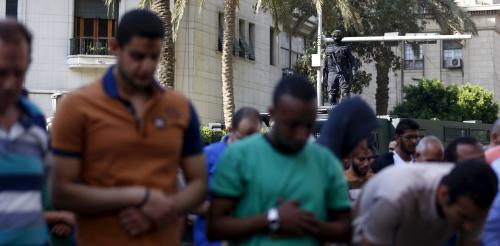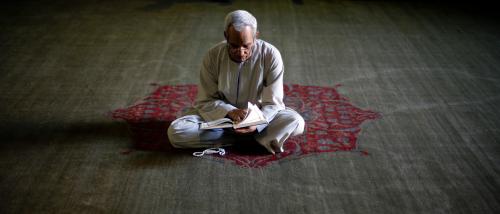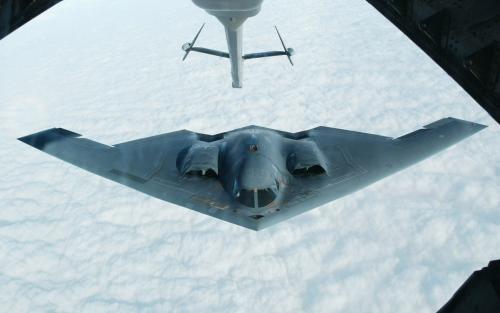We recently put a set of questions to ten expert contributors participating in our Rethinking Political Islam initiative. (See here for the list of scholars.) They are among the leading scholars of Islamist movements, with each having conducted extensive fieldwork on Muslim Brotherhood and Brotherhood-inspired groups in 12 countries.
The first question we posed to our experts was: How likely is it that the Muslim Brotherhood will abandon its official non-violent stance? The second question, and the focus of this post, is: How likely is it that an Islamist group will govern in each Arab country listed at some point before 2020? Participants gave their answers in the form of a percentage value expressing the likelihood of an Islamist group coming to power in a number of countries across the region. Below, we’ve summarized and averaged the responses we received.

Overall, our participants believe that the country most likely to have an Islamist-led government by 2020 is Tunisia, coming in at 53 percent. Interestingly, but perhaps not surprisingly, this was closely followed by three countries racked by civil war: Syria (47 percent), Yemen (47 percent), and Libya (39 percent). Among the lowest are Egypt (12.9 percent), Bahrain (10.7 percent), and Oman (10 percent).
Participants differed widely on what constitutes “Islamism” in government. One participant in the survey defined an Islamist as “a political activist/party/entity aiming to implement an understanding of sharia laws via state organs or to rule the state by that understanding.” According to his definition, then, Saudi Arabia was already an Islamist state. However, some other experts characterized Islamism as being contingent on popular social movements represented by a political party. From this perspective, Saudi Arabia is more accurately seen as a “strong monarchy with no Islamist party in the wings.” Meanwhile, one participant wondered whether Tunisia’s Ennahda might still be described as desiring “Islamist” governance any longer (In recent years, Ennahda has sought to separate the party structure, hizb, from its antecedent social movement, haraka, and has also eschewed the label “Islamist” in favor of “Muslim democrat).
Islamists are unlikely to take power in countries where formal, electoral politics are not open to citizens. When countries are governed by monarchies and political parties are banned, it is exceedingly difficult—short of revolution, coup, or large-scale destabilization—for an Islamist group to gain executive power, especially if one is defining Islamism as a popular movement. One scholar noted that “the political systems in [for example] Oman [and] Saudi Arabia ensure that Brotherhood movements, despite the popularity they may hold, will not manage to gain any say, as political parties are banned, and no politically significant elected bodies exist.”
Yet, even in such closed systems, some of the scholars we polled made room for scenarios where Islamist parties come to some sort of agreement with the ruling autocracy and thereby achieve some limited degree of influence. For instance, one of our experts said, “I do however hold out a small chance of a situation (10 percent) in Bahrain whereby the crown makes a deal with al-Wefaq (the main Shiite Islamist opposition group) to stave off a new round of severe popular unrest.” Even then, this influence would come about through informal deal-cutting with the state, rather than democratic legitimacy.
Conversely, in places like Kuwait—where Islamists are allowed to participate in parliamentary elections—Brotherhood-affiliated groups have been adept at coalition building and compromise in a bid to increase their influence. There, one scholar—who gave Islamists a 20 percent chance of governing—the Brotherhood political bloc is “increasingly involved in coalitions with secular blocs and even some activist Salafis to secure political reforms, and so it is uncertain to what extent their, if they were to gain power, would be of an Islamist character.” In these cases, Islamist parties could play a role in governing and even lead governments, as in Morocco since 2011, but their authority would be significantly circumscribed by powerful monarchies with veto power over major decisions.
Organizational cohesion is the key to survival. When Islamist parties are well organized, they can weather political blackouts. Organizational coherence pays even greater dividends when the non-Islamist opposition remains fragmented.
Tunisia and Egypt are good examples of this. One scholar polled said that though “Egypt’s Muslim Brotherhood is hobbled and under strict military control… [it] remain[s] one of the best organized political forces in the country and, should Egypt undergo re-democratizing political upheaval (unlikely perhaps but possible) in the short term, it is conceivable that the Brotherhood could somehow come back to present a strong showing, partially because alternative political parties are likely to be organizationally limited.” Speaking on Tunisia, another scholar gave Ennahda a 70 percent chance of governing by 2020. “In the context of an ever-more fragmented secular camp, Ennahda has become once again the most powerful party of Tunisian politics.”
Islamists are already filling governance vacuums in weak states. This is mostly true of countries engaged in intrastate conflicts or civil wars. “For some countries,” said one scholar, it depends on whether the question (i.e. whether Islamists will govern by 2020) implies they govern the entire territory or only part of a country’s territory. If the latter, then several countries (Yemen, Syria, Libya) already meet the criteria.” Another stated that in a post-war Syria an “arrangement in which Islamists are likely politically dominant within an area of the country ruled by Sunni Arab opposition” is conceivable.
Islamist groups across the region are scaling back their political aspirations in response to crackdowns or weak electoral showings. One participant remarked that, “In general, Islamist groups have begun curtailing their ambitions after seeing what has happened in Egypt. They not only realize the difficulties of being in charge, but I don’t believe they have fully figured out how or whether it is possible to lose political power without losing their social and religious legitimacy.” This naturally makes them more cautious than they might otherwise be, and certainly makes them more cautious than a comparably influential secular party might be. Another said that “moderate Islamists are, generally speaking, in retreat from public political life (which is not to say that they are necessarily losing popularity).”
Islamists can retain influence without being formally in charge. Referencing Lebanon, one expert noted that the country “is presided over by a Christian Maronite and by an often secular Sunni Prime Minister. Formally speaking, then, it cannot be ruled by an Islamist party. However, informally, the [current] president of the country, Michel Aoun, is an ally of Iran, so Hezbollah can be expected to exert a considerable amount of power.” Unusually for a U.S. ally, the Lebanese government includes two Hezbollah ministers, despite the group being designated by the United States as a foreign terrorist organization.
Yousuf Abdelfatah contributed to this post.
The Brookings Institution is committed to quality, independence, and impact.
We are supported by a diverse array of funders. In line with our values and policies, each Brookings publication represents the sole views of its author(s).








Commentary
How likely is it that an Islamist group will govern in the Middle East before 2020?
August 2, 2017